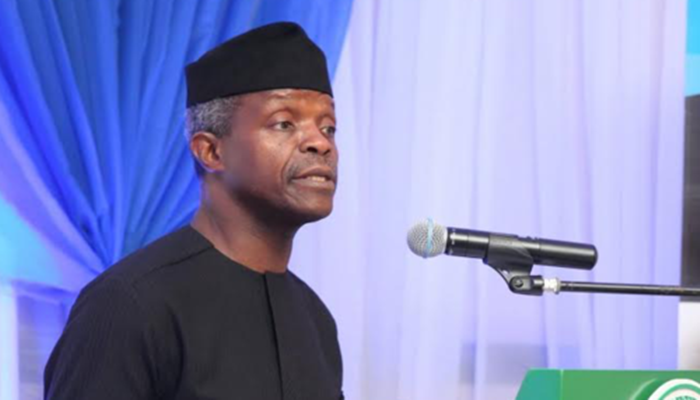We cannot pretend that wages in Nigeria are adequate – VP Osinbajo
*Says journalists, judges, lawyers others are poorly paid
“We have to address concerns about what people earn and if it is right for them to earn what they earn. The truth is we cannot pretend that these are wages that make sense, if a president of a country does not earn as well as CEO of a good private company, then there is something wrong with that type of system.”
“So, I went to the SSS place because I had no choice, I was the only professor in the entire setting and Gbile my dear friend had been captured and his wife had hung everything around my neck. They kept me in their office for close to 24 hours and nobody said anything to me except that I heard loud screams of people who are being beaten or tortured in the rooms down the building.”
REMARKS BY VICE PRESIDENT YEMI OSINBAJO, SAN AT THE END OF YEAR RETREAT OF THE STATE HOUSE PRESS CORPS TITLED “JOURNALISTS AND RETIREMENT PLAN”, HELD AT THE STATE HOUSE CONFERENCE CENTRE, ABUJA ON MONDAY DECEMBER 18, 2017
PROTOCOL
Let me say first that the State House Press Corps is very much a part of the State House family in any administration and I am especially pleased and honoured to have been invited to participate in what really is a domestic but important debate.
I have always been in some senses, a media person by default sometimes and by the nature of my other engagements. I served on the advisory board of The News Magazine and Tempo for many years, as a matter of fact I was the one that incorporated The News and Tempo and it was then that I realized just how difficult it is to do business with journalists or for journalists because I was never paid any legal fees for all my efforts (General laughter). We sat at various meetings but no sitting allowances, in fact I always wonder how come there is no reward for all the effort even when I see them selling a number of the newspapers. I fully understand why it is that there really needs to be a debate on this issue of remuneration.
My other engagement as a “media person” was when I co-founded an anti-corruption organization called “Integrity’’ in 1994 and we had a publication called the “Scrutiny” – a two sheet (back and front) where we covered a lot of issues about corruption. My good friend Nduka Obaigbena who had just started his newspaper agreed to put this Scrutiny inside ThisDay newspaper, so it was circulated with ThisDay at the time. The editor of that paper was Mr Gbile Osadipe who was at one time a journalist at the Tempo but then came to work with me on this anti-corruption organization as the editor of the paper.
One afternoon, the SSS came to the office and asked of one professor and Gbile said the professor was not around but they said it was a lie (that Gbile looked like one because he was always wearing a round pair of glasses.) So, they took him to their place at No 15 Awolowo road and kept him there.
Then Gbile’s wife called me to inform me that the SSS had come to the office looking for one professor and had taken her husband and that her husband was not a professor. So, I went to the SSS place because I had no choice, I was the only professor in the entire setting and Gbile my dear friend had been captured and his wife had hung everything around my neck. They kept me in their office for close to 24 hours and nobody said anything to me except that I heard loud screams of people who are being beaten or tortured in the rooms down the building.
So, late that night, at about midnight or so, one guy comes to me and says “I hope you heard all that’’. So he brought out some of those pamphlets and showed me saying that “do you think all these things that you have written are worth the kind of things that are going on in there, are you ready to sacrifice your life for this thing?’’. So I was quite sure that I would end up down there. But somehow, I think it was just sheer providence, another fellow comes into the room, and says that somebody had spoken to her, probably somebody I should had taught in the University, and said I just go away and I should carry all my papers and leave.
It taught me two things first that it is important to continue the struggle but I realized that this was not even a profession from which one could make a decent living unless you found a really good way of doing so.
But more importantly for me was the fact that you are just on your own and except in the days of the military days where the press association supported their own, but for some of us that don’t belong to them, we might just end up in detention for a longer period.
My third engagement with the media was that I wrote a book which was a textbook on media law in Nigeria which I co-authored with Prof. Peter Fogam and for a while, the book was used as a text in a lot of law schools and faculty. But one of the important things that I made sure was considered in that book was the whole range of issues that address why journalism profession is so wide open and what needed to be done to perhaps regulate it in such a way that it operates in the sense like other professions. But then that perhaps is a point for another occasion.
I think what you have taken on, this topic of remuneration and retirement is very important especially for those in formal employment in the media.
There are few reasons in my view, why remuneration is poor, especially those who are formally engaged like those of you here today and I will show you that it is not just in your profession and why that is the case.
The first is that it is just simply cheating. There are owners of media who are just cheats. They just want to get something for nothing. And that is not uncommon, it is a general malaise. It is not necessarily restricted to the media; it is also the same in the legal profession. There are many lawyers, if you hear how much they earn, you will certainly not want to be a lawyer.
The other is that the private sector does not really recognize or respect a minimum wage. So, even if a minimum wage is set nationally, it is not necessarily respected by the private sector. And this is something that should be factored into the status of the company and whether a company is even compliant with its tax requirements and all that. In other places these are points which are checked even before you are being considered for tax, so we need to enforce some kind of adherence to the minimum wage structure especially so that there is a certain amount of regulation on how people are paid and what they are paid.
The third, of course, is that the entry of journalism as a profession is not rigorously enforced. Most professions are able to pay better because there are entry requirements that are rigorously enforced but that is not the case in journalism.
There are those who are formally trained as journalists but a profession will admit anybody at all even if you are not formally trained as a journalist. And that is even more now with social platforms, with blogs and all sorts of other ways by which you can enter into journalism, that is just the nature of the business that you are engaged in. So, you must take that burden along with you because there is nothing you can do about that, anybody can enter the journalism profession.
The other thing is market and the whole field of journalism. Everywhere people are well paid, the market usually determines what they are paid. It is very difficult to negotiate a pay unless it is market driven. In other words, if a journalist somehow has found himself in a very good position, in terms of the market – it is accepted that the market is somebody whom you must read and somebody in the news you must watch. I remember Frank Olize and Abike Dabiri on Newsline. At a point in time, they became important items in their news organization and they had to be paid well otherwise they will simply go somewhere else.
The most important thing to do in situations like this is that each person must seek ways for self-improvement and become some kind of a sector expert. This is what I found in the legal profession for example, that entry-level people are usually poorly paid but in five years after working in a firm you become good at something and when you are good at something your employer has to pay better otherwise you go elsewhere or if you are not good at anything and you are so general that anybody can replace you, then the market simply says you don’t deserve to be paid better.
So, the market is very crucial and I think that self-development is very important at marketing. And then, of course, the market determines whether a TV station or a newspaper organization will make money and if they are making money, they must pay.
Again, it is market driven, so Channels is making money because it is a TV station that many people watch and they get endorsements and all that.
That is how it works everywhere in the world, it is where Journalists are working, the market is crucial, and if they are working, pay, to them, is the function of the success of the news organization.
Professional associations to be brought to the forefront, this happens in many other parts of the world, actors guild and all of those newspaper associations also struggle lobbyists for good pay for their members.
I think that should happen more frequently, these professional associations should engage newspaper or TV stations that don’t pay. I think this engagement should be robust with attention paid to it so that people are better paid.
Generally speaking, people are poorly paid in this country both in the private sector and the public sector. There is a need for us to look at the broad perspective, why is it that people are so poorly paid?
Look at the Judiciary, I know that in 1999, when I became Attorney General of Lagos State, judges were being paid N67,000 a month. I met with a group of about 7 senior judges and discussed how much would be good to get paid as a judge; 3 children in private school with the amount, medical bills with the amount and by the time we tabled down this amount, one of them said that what they were earning and what they actually spend is so far apart. So you people pretend to pay us, we too pretend to work.
It is so evident that there is a huge disparity between what people earn and what they are really supposed to earn. So we really need to take a look at that, public sector earnings.
One of the reasons I was very active in pushing for better remuneration for judges which I was able to achieve and got others in other states to move up their wages, was because I went to visit a retired judge, a honest one. I met him in a house in Gbagada at the time, two rooms in someone’s boys’ quarters. This is someone who had retired close to 10 years, it was so depressing.
We have to address concerns about what people earn and if it is right for them to earn what they earn. For example, if the President earns less than N2million a month, my own pay is N1.5million, how does the President earn that kind of money? And also ministers who earn much less; it says N4 million for housing allowance, and for example, if we are to review ministers’ remuneration, what would you journalists say? You would be all over the place shouting, what does this country earn?
The truth is we cannot pretend that these are wages that make sense, if a president of a country does not earn as well as CEO of a good private company, then there is something wrong with that type of system.
I think journalists have a role to play in what should be a good, just and sensible pay. What is the kind of pay that ensures people don’t improvise by collecting brown envelope? I think that debate is what we should have.
Regarding the contributory pension scheme, I know that many of us participate in it. As a matter of fact, one of the comfort I have is that so long our employers play their own part, we are likely to have a decent pension. I think it is something that all employers must be compelled to do.
It is my pleasure to declare this seminar open and to wish you a Merry Christmas and that 2018 will be our best year yet.




